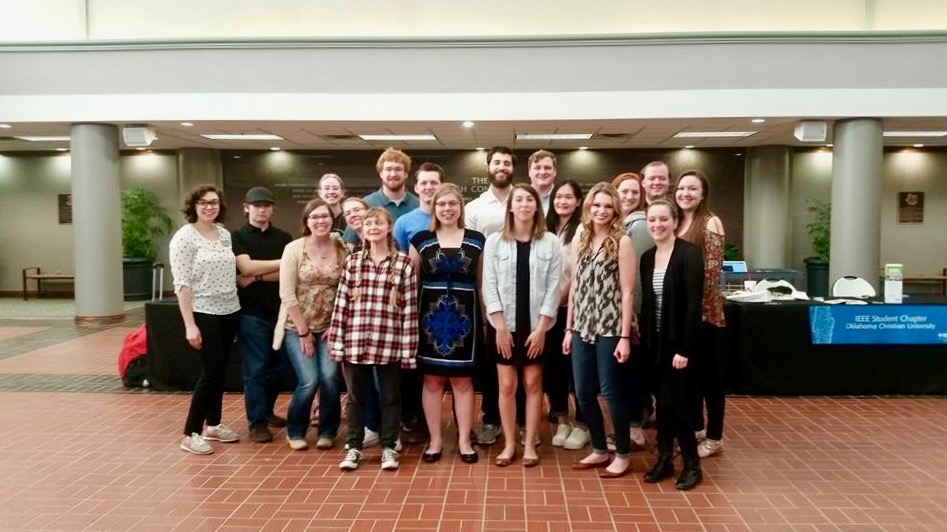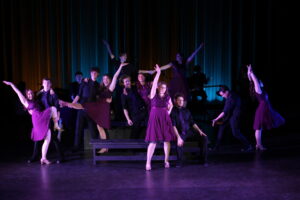The number of women in STEM-related fields is increasing, and Oklahoma Christian University’s Scientista organization is working to create a support system for the female STEM majors on campus.
A recent study examined how children develop gender stereotypes in science. After charting changes through research done from 1966 to 2016, they found children are much more likely to draw a female scientist today than 50 years ago.
“If you had asked a young child 50 years ago to draw a picture of a scientist, about 99% of the drawings would be of men,” CNN said. “Ask children to do the same drawing today, and close to a third of the pictures would be of women.”
CNN said this development can largely be attributed to the increasing number of women in a
science-related field. According to the study, the percentage of women employed as a scientist in the U.S. in 1966 rose from 28 percent to 49 percent in biological science, 8 percent to 35 percent in chemistry and 3 percent to 11 percent in physics and astronomy.
Sara Alcon, professor of biology and Scientista sponsor, said Scientista is in its third year of being a club at Oklahoma Christian and its second year as a chapter of the National Scientista Foundation. She said Oklahoma Christian’s Scientista was the first national chapter to have both male and female members, because they believe this is not a conversation they can properly discuss in isolation.
“Scientista is primarily designed to empower women in STEM,” Alcon said. “We do this through creating a community of both female and male members designed to support each other, encourage one another through the difficult times and discuss challenges and obstacles that our students may either be currently facing or may face in their future careers.”
Jenna Lippe, co-director for Scientista, said they try to do two events every month, including reaching out to younger kids, going to schools and teaching programming or chemistry. Lippe said Scientista is open to people of any major who have the same goal—to be a support system for women who exist as a minority.
“It wasn’t until I got to OC that I really saw that there are like only two other girls in my classes,” Lippe said. “I saw what people are talking about, that there’s not that many women in STEM.”
Freshman biology major Emmeline Prinz said she will be a general officer for Scientista in the 2018-2019 school year. She said she enjoys how Scientista activities vary in a wide range of fields, from service projects and leading chapel to baking cookies.
“Through Scientista, I hope to nourish an environment where women in STEM and the community feel empowered to step into roles they might otherwise shy away from, because those roles are typically male-dominated,” Prinz said.
According to Prinz, at the beginning of her first year of college, she was not concerned about a difference in the number of male and female students in STEM classes. She said she felt there was almost an equal amount of both, but as the year progressed, she noticed more females dropped the classes than males.
“This is troubling, because it shows that there must be some underlying factor in which men have an easier time staying in the STEM field,” Prinz said. “I have only felt slightly looked over because I am a female in a STEM major. I cannot count the number of times that, when people hear I wish to become a physician, they reply with, ‘Are you sure you can handle that much schooling?’ This is rather disheartening, because it causes women to doubt their ability to withstand a rigorous education.”
According to Alcon, she has had very strong STEM female role models throughout her life. Alcon said she thinks it is always easier to have someone a few steps ahead of you to help guide you along the easiest path.
“If that person is like you, whether male or female, minority or majority, single or married, low income or high, or whatever demographic you want to look at, they can help you identify the pitfalls and maximize the advantages of that categorization,” Alcon said. “This is the fundamental principle behind mentorship.”
Lippe said she had many influential female mentors before she got to college, but at Oklahoma Christian, she had to work harder to find them.
“A big thing is that we have one female engineering professor who is relatively new,” Lippe said. “I really had to seek out role models, which is part of what Scientista works on. It’s very, very hard to do something that you’ve never seen done before, and Dr. Alcon is one of my role models. She took her time to really be a role model for us, and I try to be that for younger people as well.”







Be First to Comment